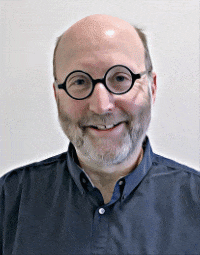|
Latest
|
 |
Small-r realism accommodates the fallibility of inductive inference by positing, as a general principle, that inductive inferences from experience can provide strong support for the truth of the contingent propositions of a scientific theory, but that whether that support has been realized must be left to a case-by-case analysis of individual sciences. |
Download |
 |
This short note reviews briefly how the fallibility of inductive inference in small-e empiricism makes truth opaque. Once truth is no longer a condition for knowlege, Gettier cases cease to be troublesome and turn out to be celebrated as important discoveries in the progress of science. |
Download |
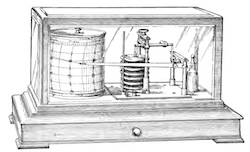 |
small-e empiricism is a version of empiricism adapted to modern science. It abandons the inductive skepticism of Big-E Empiricism and represents experience as a physical process, human or instrumental, that connects continuously with the system of interest. |
e
small-e empiricism. Download draft chapters. |
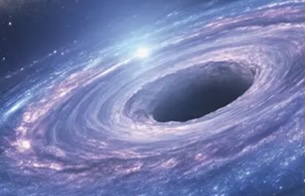 |
Einstein insisted doggedly, but mistakenly, that there is a physical singularity at the event horizon of a Schwarzschild black hole. His insistence arose from his use of mathematical methods different from those we now use. This is a short, popular version of my longer "Einstein against Singularities: Analysis versus Geometry." |
"Einstein against black holes:
Why Einstein thought what he thought," IAI News, August 29, 2025. Institute of Arts and Ideas, Hay-on-Wye, Wales, UK. download. |

|
Common origin inferences allow us to infer from coincidental agreements to their common origin. The material theory of induction allows us to determine when such inferences are cogent and how strong they are.
|
"Common Origin Inferences and the Material Theory of Induction" Philosophies 2025, 10(5), 94; pp.1-12. Download.
|

|
Einstein's hole argument, as adapted to more recent philosophy of science, provides a physically motivated guide for deciding which elements of a theory represent distinct realities in the world. Two theoretical structures do not represent different realities if the two do not differ in observables and if the prevailing theory cannot determine which will arise from the same boundary conditions.
|
"Spacetime is not a substance," IAI News, 9th March, 2025. Institute of Arts and Ideas, Hay-on-Wye, Wales, UK. Download.
|
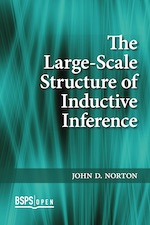
|
Here is a 2500 word précis of my Large-Scale Structure of Inductive Inference prepared for a book symposium at the Journal of General Philosophy of Science. There are also my responses to commentaries by Milagros Maribel Barroso Rojo, Job de Grefte and Julien Tricard.
|
"The Large-Scale Structure of Inductive Inference: A Précis" Journal of General Philosophy of Science, Online December 8, 2025. Download.
"Replies to Barroso Rojo, de Grefte, and Tricard" in Book Symposium, The Large-Scale Structure of Inductive Inference. Journal for General Philosophy of Science, Online December 11, 2025. Download.
|

|
Here's a light but intriguing problem. How far past the edge of a table can a stable stack of blocks extend? Just make the stack tall enough and it can extend as far as you like. What happens when you take the limit of an infinite stack? Not what you might expect!
|
"The Block Stacking Problem" in Goodies.
|
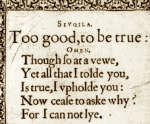
|
Nearly a century of efforts have failed to find a novel connection of foundational importance between thermodynamic entropy and notions of information and computation. This paper is a short summary of how these efforts have failed. It includes an account of how the Landauer principle conflates dynamic with static probabilities.
Too good, to be true is a utopian work published by Thomas Lupton in 1580. |
"Too Good to be True: Entropy, Information, Computation and the Uninformed Thermodynamics of Erasure," Download manuscript.
|
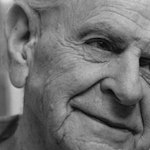
|
Popper's bold attempt to find an account of the rationality of
science that did not employ inductive inference was destined to fail from the start, since science is an ineliminably inductive venture. |
"The Rise and Fall of Karl Popper's Anti-inductivism," Download.
Here is a more informal polemic:
"Why Falsifiability does not Demarcate Science from Pseudoscience" in Goodies.
|

|
In his treatment of spacetime singularities, Einstein privileged
analytic expressions over geometry. Modern relativists do the
reverse and thus find Einstein's discussion baffling. |
"Einstein against Singularities: Analysis versus Geometry," Philosophy
of Physics 2(1): 13, 1–73. DOI: https://doi.org/10.31389/
pop.91. Download.
|

|
A purely thermodynamic argument precludes dissipationless erasure.
Gibbs' "- k p log p" entropy formula, properly applied, does not
assign an information entropy to pre-erasure states. Suppressing
fluctuations remains the principal source of dissipation in
molecular scale processes. |
"The Simply Uninformed Thermodynamics of Erasure," Philosophy of Physics 3(1): 3, 1–21. Download.
|

|
Adding a conical singularity to a Minkowski spacetime produces a
temporally non-orientable spacetime that is everywhere flat
excepting in regions enclosing the singularity. Time travel arises
in the sense that a traveler, passing the singularity, is returned
to the traveler's past where the traveler encounters the traveler's
past self. |
"A Simple Minkowskian Time-Travel Spacetime," American Journal of Physics, Vol.93, Issue 3 (2025), pp. 241–249. Download.
|

|
Both Wayne Myrvold and I have written pieces, relating to
Landauer's principle, in which fluctuations are alluded to in their
titles. We explain that the pieces are mutually compatible. |
(With Wayne Myrvold) "On Norton’s '...Shook...' and Myrvold’s
'Shakin’ ...' " Philosophy of Physics, Vol. 1, Issue 1,
Article 5. 2023. Download.
|
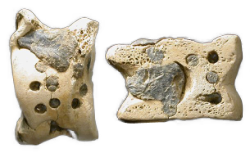
|
In lotteries and bookmaking, analyzing chance systems globally
provides advantages over local, probabilistic analysis. Global
thinking also explains how ancient thinkers who had no theory of
probability may have found physical randomizers like dice fit for
their purposes in gambling, lot drawing and divination. |
"Lotteries, Bookmaking and Ancient Randomizers: Local and Global
Analyses of Chance," Studies in History and Philosophy of
Science, 95 (2022), pp. 108–117. Download. |
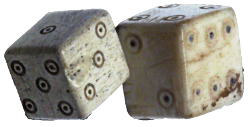
|
A precursors to probability theory was a seventeenth century
theory of chance for physical randomizers. It used combinatorics to
count chances and derived a serviceable rule for determining which
are fair wagers. It lacked an epistemic notion of chance and a
precise means to connect chance counts and frequencies; and could
not compare chances across different games. |
"Chance Combinatorics: The Theory that History Forgot," Perspectives
on Science 31 (6), (2023), pp. 771–810. Download. |
 |
In the material theory of induction, inductive inferences are
warranted by domain specific facts. Those facts are in turn
supported by further inductive inferences. This volume examines the
large-scale structure of the resulting tangle of inductive
inferences and relations of inductive support. |
The Large-Scale Structure of Inductive Inference. BSPSopen/University
of Calgary Press, 2024. Download
(Sequel to the earlier volume, The
Material Theory of Induction.)
Book launch video, December 4, 2024.
|
 |
Mousa Mohammadian, William Peden and Elay Shech have each written
commentaries on The Material Theory of Induction in a
symposium organized by the journal, Metascience. Here is
my responses and my thanks to them. |
"Author’s response to Mousa Mohammadian, William
Peden and Elay Shech," Symposium on The Material Theory of
Induction, in Metascience. 31
(2022) pp.317–323. Download. |
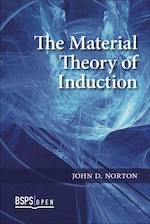
|
Which are the good inductive inferences or the proper relations of
inductive support? We have sought for millennia to answer by means
of universally applicable formal rules or schema. These efforts have
failed. Background facts, not rules, ultimately determine which are
the good inductive inferences. No formal rule applies universally.
Each is confined to a restricted domain whose background facts there
authorize them.
The Material Theory of Induction.
Contents:
Preface
Prolog
1. The Material Theory of Induction Stated and Illustrated
2. What Powers Inductive Inference?
3. Replicability of Experiment
4. Analogy
5. Epistemic Virtues and Epistemic Values: A Skeptical Critique
6. Simplicity as a Surrogate
7. Simplicity in Model Selection
8. Inference to the Best Explanation: The General Account.
9. Inference to the Best Explanation: Examples
10. Why Not Bayes
11. Circularity in the Scoring Rule Vindication of Probabilities
12. No Place to Stand: the Incompleteness of All Calculi of
inductive Inference
13. Infinite Lottery Machines
14. Uncountable Problems
15. Indeterministic Physical Systems
16. A Quantum Inductive Logic
Epilog |
The Material Theory
of Induction. BSPSOpen/University of Calgary
Press, 2021.
Open access. FREE download under a CC-BY-NCND 4.0 Creative Commons
license.
|

|
Infinity and chance are dangerous notions that can lead us to deep
puzzlement and baffling paradoxes. Careful examination of them
allows us to see past the paradoxes to a clear and controlled
understanding of what was once perplexing and unapproachable. |
Paradox:
Puzzles of Chance and Infinity
is my new on-line book for an introductory level, undergraduate
course. |
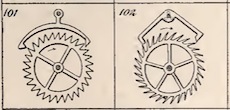 |
Contrary to Hume, science has found many ways in which things
connect with other things in the world. Causal metaphysics, however,
has failed to add anything factual to the relations discovered by
science. It is at best an exercise in labeling that may have
practical uses. |
"The Metaphysics of Causation: An Empiricist
Critique." pp. 58-94 in in Yafeng Shen, ed., Alternative
Approaches to Causation. Oxford: Oxford University Press,
2024.
Download. |
|
|
|
|
